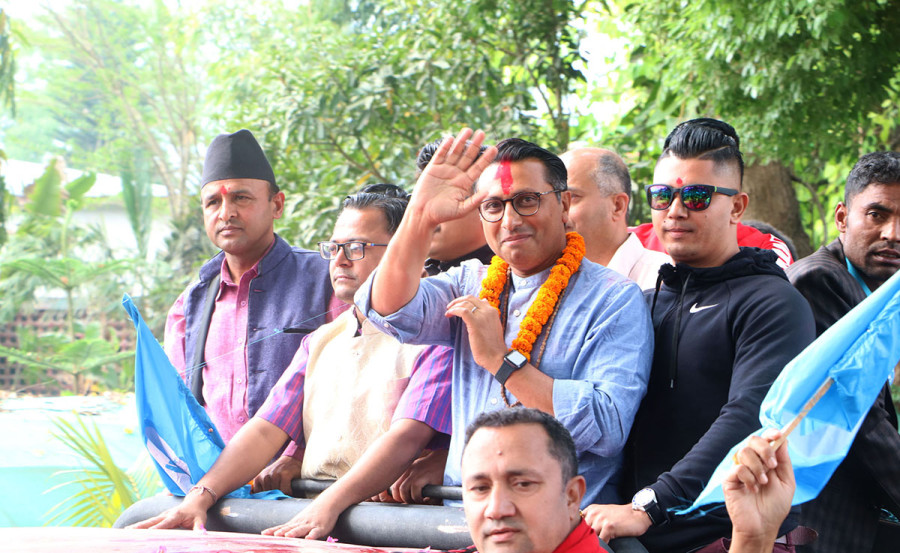Columns
National mood-swing
The by-elections have reaffirmed the young voters’ disillusionment with traditional political parties.
Anurag Acharya
The recently conducted by-elections in Chitwan, Tanahun and Bara will do little to upset the current political equation inside Parliament. But outside the corridors of power, the fiercely contested polls for a mere three seats have reaffirmed a decisive shift in the public sentiment. People are disappointed with the established parties and their performance over the past decades and are willing to take their chances with new faces and ideas.
There are plenty of emerging young leaders inside the established national parties as well. However, the party top-brass have a generational gap with these leaders and do not see eye-to-eye on most pressing national issues. Their past contributions aside, the tired old faces of Nepali politics simply don’t have the vision or the body language to appeal to their own party rank and file anymore, forget about the young electorate.
Young leaders like Gagan Thapa and Bishwa Prakash Sharma in the Nepali Congress; or Bishnu Rimal, Yogesh Bhattarai and Gokarna Bista in the CPN-UML offer hope to their respective party loyalists. But thousands of young voters have come of age in the past decade, and clearly, they are not prepared to wait any longer. They will judge the political parties based on their top leadership and their service delivery.
The general elections and the by-polls indicate that the voters are increasingly attracted towards newer outfits like the Rastriya Swatantra Party (RSP) and the Janamat Party. The idea of an alternative political force in Nepali politics gained credence in 2006, when the Upendra Yadav-led NGO, the Madhesi Janadhikar Forum, established itself as a political force amid a wave of public discontent with the established parties and their leaders in the Tarai-Madhesh region. A decade and a half later, the new Janamat Party leader CK Raut challenged Yadav and defeated him to emerge as a formidable force in the region. As of this article going to press, Yadav is leading in the by-polls from Bara, where his competitor is once again a Janamat leader, Shiv Chandra Kushwaha.
In Tanahun, former Nepali Congress leader and economist Swarnim Wagle has secured a comfortable margin against his competitor, the Nepali Congress leader Govinda Bhattarai. Wagle had defected to the Rastriya Swatantra Party only a month back to become its candidate in Tanahun, citing a lack of opportunities inside the Nepali Congress. But, it is the manner in which he walked out of the party, citing its weak governance and internal democracy, that will further erode Nepali Congress’s image within the public.
Wagle’s victory and his public approval will undoubtedly rub off on the RSP, which may continue to expand its voter base. What is bizarre though, is that RSP chair Rabi Lamichhane managed a strong show in his Chitwan constituency yet again, despite being found guilty of forging obtaining dual citizenship and being debarred from his parliamentary seat from there. Public reaction to media reports on Lamichhane’s questionable credibility and integrity means their disillusionment with the established parties and their leadership is strong enough for them to overlook Lamichhane’s misconduct. Or is it an indication of Nepali media losing credibility among a large section of the population, as Lamichhane claimed in his long public rant against the media?
In either case, public discontent with major parties and their leadership has pushed them to seek new faces and alternate forces. While this will allow untested leaders like Wagle and his RSP colleagues to prove their mettle in national politics, there is also a clear risk of populist leaders rabble-rousing and pushing the public into further cynicism. Such a scenario will have a domino effect that may continue into the next cycle of elections in 2026.
If parties like the RSP and the Janamat give space to more young and ambitious leaders from different parties who have been frustrated with old vanguards occupying space at the top, it would decisively swing the nation’s mood against the established political parties. On the other hand, the rise of the RSP and the Janamat Party could also push the established parties into a cultural reset. For instance, Nepali Congress leaders like Gagan Thapa and Bishwa Prakash Sharma have become more vocal in their calls for a lateral entry into the party top-tier to bring-in new leaders with fresh ideas inside a party that has remained stagnant for a long time. Wagle’s unceremonious departure from the party would have only made their case stronger. But the only realistic chance of that happening is at the Nepali Congress’ next general convention, which is still a few years away.
Among the communist parties, Baburam Bhattarai has repeatedly implored the senior leaders to give way to younger leaders inside their respective parties. For now, such a call seems to be falling on deaf ears as Prime Minister Pushpa Kamal Dahal, KP Sharma Oli and Madhav Nepal show no signs of stepping down.
Four years is not a long time in a nation’s life, but it is just about enough for the political parties and their leadership to make amends in their favour. Those who choose to remain oblivious and disregard the early signs of the national mood-swing, will do so at their own peril.




 11.12°C Kathmandu
11.12°C Kathmandu















